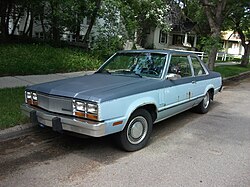Mercury Zephyr
| Mercury Zephyr | |
|---|---|
 | |
| Overview | |
| Manufacturer | Lincoln-Mercury (Ford) |
| Production | 1978–1983 |
| Assembly | St. Thomas, Ontario, Canada Kansas City, Missouri Mahwah, New Jersey Hapeville, Georgia |
| Body and chassis | |
| Class | Compact |
| Body style | 2-door sedan 2-door coupe 4-door sedan 4-door station wagon |
| Layout | FR layout |
| Platform | Ford Fox platform |
| Related | Ford Fairmont Ford Durango |
| Powertrain | |
| Engine | 140 in³ OHC I4 200 in³ Thriftmaster Six I6 255 in³ Windsor V8 302 in³ Windsor V8 |
| Transmission | 4-speed manual 3-speed C3 automatic 3-speed C4 automatic 3-speed C5 automatic |
| Dimensions | |
| Curb weight | 2,747–2,959 pounds (1,246–1,342 kg)[1][2] |
| Chronology | |
| Predecessor | Mercury Comet |
| Successor | Mercury Topaz |
- For other Ford-related cars called Zephyr, see Ford Zephyr, Lincoln-Zephyr, and Lincoln Zephyr
The Mercury Zephyr is a compact car sold by the Lincoln-Mercury division of Ford Motor Company for the North American market. Introduced as a replacement for the Mercury Comet, it was produced from 1978 to 1983. Along with its corporate cousin, the Ford Fairmont, it was the first use in the Mercury division of the long-lived unibody Fox platform, which did not completely leave production until 2004.
Zephyr, taken from a poetic name for the west wind, has a considerable history in the Ford line. It was first used in the late 1930s for a smaller, less expensive Lincoln, which provided the basis for the first Continental. From 1950 to 1972, it was used on a European Ford model. In 2006, it returned to the Lincoln line once again.
Design
The Mercury Zephyr shared most of its characteristics with the Ford Fairmont; both were available with four, six, or eight-cylinder engines and appeared in coupe, sedan, or station wagon forms. At introduction, the Zephyr was most easily distinguished from its Ford counterpart by its curved grille and four square headlights. The Fairmont was styled with a flatter grille and two headlights. In 1981, an adaptation of the Zephyr's four-light front was also used on Fairmonts. The Zephyr was outfitted with Ford's 'Ride Engineered' suspension package.
By 1982 and 1983, Zephyr options dropped off one by one as the Marquis and Topaz were being readied for the market. In 1983, both of the V8 engine options were discontinued. These cars became popular to drag race because they are relatively aerodynamic, lightweight, and have a large engine compartment which easily accommodates the Big Block 460 Ford engine.
Zephyr Z7

Along with regular 4- and 2-door sedans (and 4-door wagons) introduced in 1978, Mercury also released a limited production, uniquely styled 2-door version of the Zephyr called the Z-7. Influenced by the larger Ford Thunderbird, the Z-7 was a 2-door coupe featuring a wrapover roof design (also inspired by the Crown Victoria of the 1950s) with wraparound taillights. Many Z-7 models included a two-tone paint job; under the hood, the powertrain usually featured either the inline-six (I6) or one of the V8 engines (very few Z-7s had the four-cylinder engine). Unlike the similar Ford Fairmont Futura, which was also a trim level on sedans and wagons, the Z-7 was only produced in the 2-door coupe bodystyle for Mercury.
Discontinuation
In the early 1980s, Ford started to phase out the Fox platform as a basis for compact and mid-size family cars. Although the Zephyr weighed well under 3,000 lbs, efforts were under way to replace it with a lighter front-wheel drive car to improve the company's fuel economy numbers. The Zephyr and Fairmont were discontinued after the 1983 model year, and were most directly replaced by the Mercury Topaz and Ford Tempo, based on a stretched Ford Escort platform.
The discontinuation of the Zephyr did not spell the end for the Fox-body Mercury sedan, however. In 1983, the sedan and wagon versions of the Cougar were reskinned and rebadged as the Mercury Marquis, as Mercury downsized that product line into the mid-size segment. The flagship full-size Grand Marquis was introduced as a stand-alone model. The smaller Fox-based Marquis dropped the Zephyr's long-used 3.3 L I6 for 1984 and replaced it with the larger and more powerful 3.8 L "Essex" V6, but kept the same 2.3 L I4 as standard and the same 5.0 L V8 as an option. The Fox-based Marquis was replaced by the 1986 Mercury Sable; however, it continued production into early 1986, albeit without the 5.0L option.
See also
External links
- Fairmont page with some Zephyr material
- Four Eyed Pride - A resource for all early Foxes
References
- ^ http://www.automobile-catalog.com/make/mercury/zephyr_1977/zephyr_1977/1980.html 1980 MERCURY ZEPHYR Z-7 SPORTS COUPE 140ci data in automobile-catalog.com
- ^ http://www.automobile-catalog.com/make/mercury/zephyr_1977/zephyr_1977/1980.html 1980 MERCURY ZEPHYR Z-7 SPORTS COUPE 255-V-8 data in automobile-catalog.com

